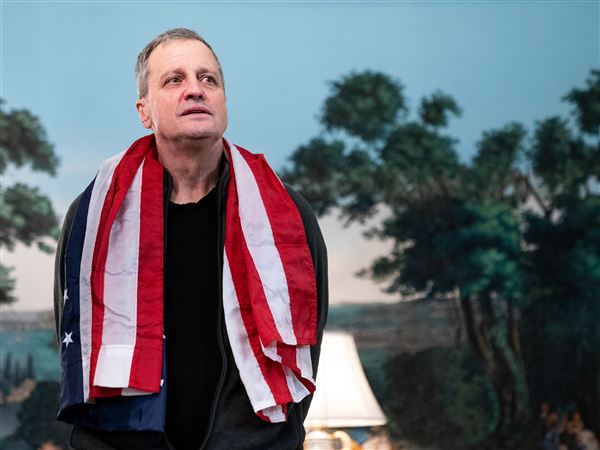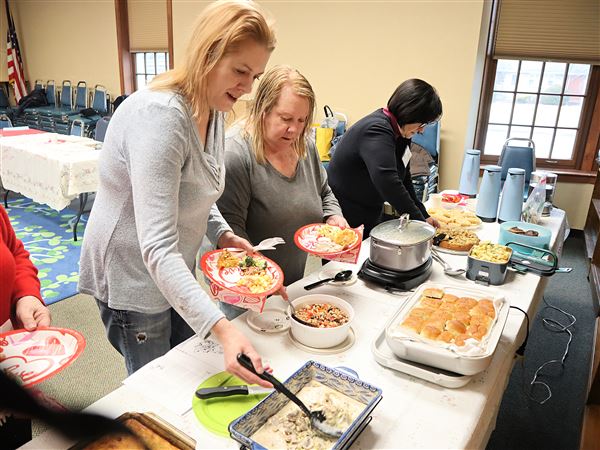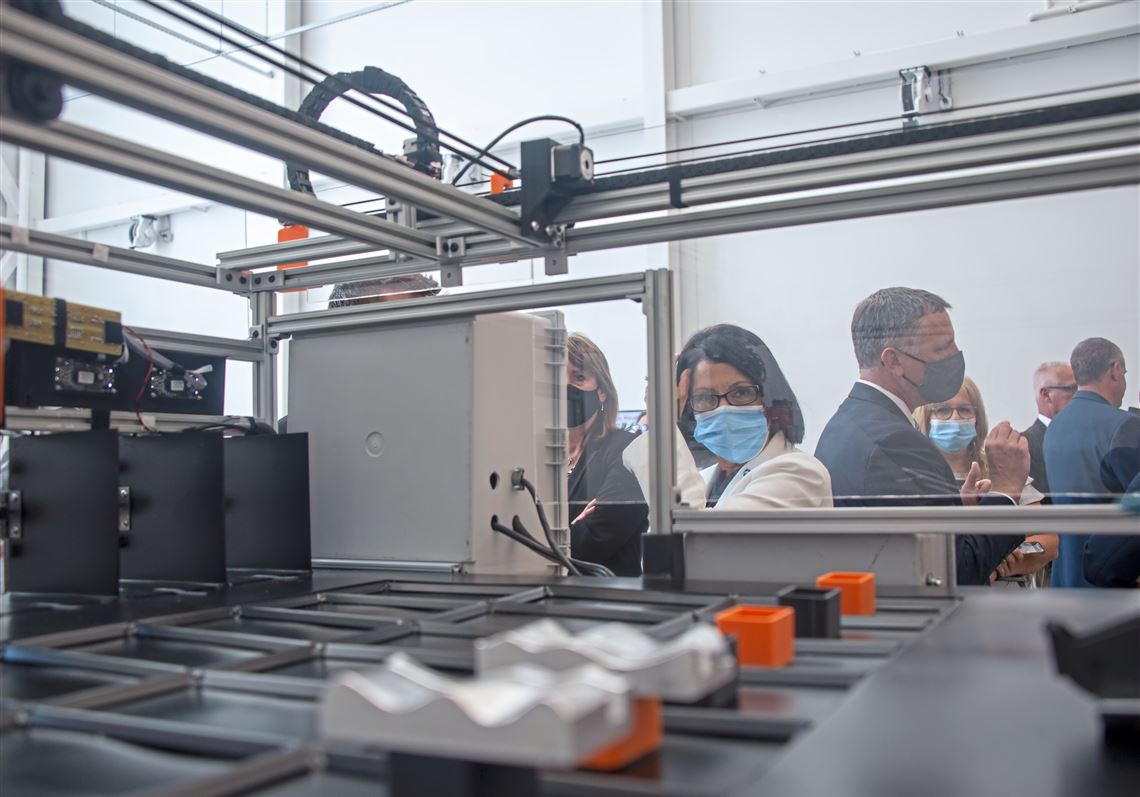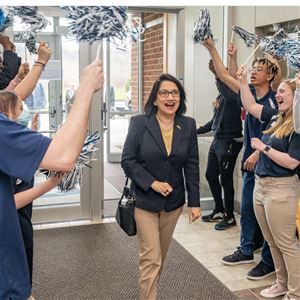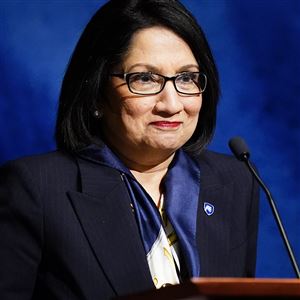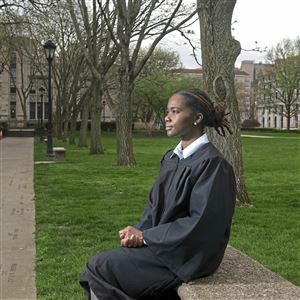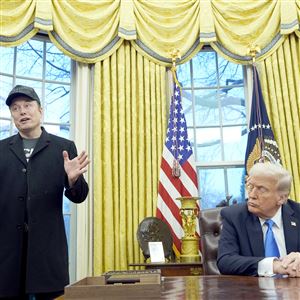College enrollments nationwide may be down, but Penn State University’s new president is bullish on her university’s sprawling statewide system including its branch campuses, even as she plans to keep a sharp focus on tuition costs and how those impact families differently based on economic means.
In a brief but wide-ranging interview with the Pittsburgh Post-Gazette, Neeli Bendapudi, 58, touched on topics from state economic development and Penn State's research impact worldwide, to why she feels strongly about not only the enrollment-flush University Park campus but the branches across the commonwealth, even as those locations feel the effects of enrollment and population loss.
In Western Pennsylvania — where declines in both birth rate and high school graduation numbers are especially pronounced — the issue has been an especially pressing one for campuses such as Penn State Beaver, New Kensington, Fayette, Greater Allegheny and Shenango, among others.
"I am very, very committed to the commonwealth campuses, for several reasons," Ms. Bendapudi said Thursday.
The branch campuses are places where "every day you see the land grant mission come to life," she said. Each offers full four-year degrees and serves not just traditional 18- to 22-year-old students in their home communities but also older adults "already in the workforce right there who need to upskill."
That combined with the economic and cultural import of those campuses to their host communities make them essential. In fact, she said, articulating that message to state leaders and the general public is among the challenges facing Penn State.
"How do we just let people know the impact that we have day in and day out? The fact that 96% of the citizens of the commonwealth live within 30 miles of (at least) one location of ours,” she said. "How do we get everybody in Pennsylvania to see the necessary investment in higher education that is at stake? Those are the big things I'm thinking about.”
Ms. Bendapudi, formerly president of the University of Louisville, was hired in December to serve as Penn State’s 19th president, succeeding Eric Barron, who headed the university for nearly a decade. She is the first woman and woman of color to lead the institution. The board approved pay including a $950,000 base salary plus benefits.
Settling in
Officially, her first day was May 9. In reality, she was on the job weeks earlier, visiting nearly all of Penn State's 24 locations in a get-acquainted tour.
As president-elect, she introduced Patrick Kraft in April as the successor to retiring athletic director Sandy Barbour. Mr. Kraft previously served as Boston College’s athletic director and worked in administrative roles at Indiana and Loyola Chicago.
He — and by extension Penn State — must navigate an increasingly unpredictable landscape in Division I intercollegiate sports where student-athletes are compensated for their name and likeness and can make decisions to transfer based on financial gain.
Ms. Bendapudi is an Indian-born scholar whose career extends from marketing to banking. She once called herself "an unapologetic extrovert" and has made clear that family is important.
Before the presidency at Louisville, she served as provost and executive vice chancellor at the University of Kansas, dean of the School of Business at the University of Kansas, and as founding director of the Initiative for Managing Services at the Ohio State University.
In addition to consulting for some of the world’s largest companies and organizations, she worked as executive vice president and chief customer officer for Huntington National Bank.
And now she’s settling into State College. Three generations of her family have relocated to the area so far, namely her husband, Venkat, daughter Sirisha, a son-in-law Kyle Ladd and grandson, Arjun. "My mother will be joining us soon," Ms. Bendapudi said Thursday.
Ms. Bendapudi, her husband and mother will live in the presidential residence and the others will be in State College.
She describes her leadership style as "highly collaborative" and expressed hope it will become a mark of her presidency.
"I've always believed that we are stronger when we bring different points of view together. Ultimately, as the leader, I hold the decision, and I will make the decision and I get it," she said. "But I find that when we are able to share honestly, as a strong team, a cohesive team, that's the way for us to succeed."
She said an important question for Penn State, with its 90,000 students, will be understanding how to leverage its scale and also stay nimble.
"And then, obviously, we have to think about the land grant mission. And how do we make sure that higher education is affordable for certainly the citizens of the commonwealth first, and beyond?"
Land grant universities are part of a program created by Congress to make sure members of a region’s working classes would have access to higher education. Such schools typically receive federal support.
Penn State resident students have seen a tuition freeze three of the last four years, with a 2.5% increase this year. The base lower division in-state rate at University Park is $18,898, not counting room, board and other fees.
She did not make a prediction on the likelihood of a tuition increase this fall — "We're not there yet" — but outlined her broader philosophy on price.
“I want us to be talking, not about just tuition increase, as though it has the same impact on everybody. Ideally, I would love a world where we have no tuition increases for anyone,” she said.
“I am more focused on what are people paying, what is the net tuition at different income levels, because ... (even) a 1% increase, if you're at the bottom of the economic pyramid, or maybe you're in the middle class, ... a teacher or a nurse putting their kid to school, that can have a huge impact.
“Whereas a 5% or 10% increase may have no impact on someone 's decision to attend college or not based on where they are with their financial situation,” she added.
“I am going to be focused more on looking at some other institutions I have been at when I've advocated for (a) tuition increase, (and) have been able to successfully use that to increase need-based aid and make sure it is affordable for the bottom rungs of the economic ladder,” Ms. Bendapudi explained.
‘It’s really a mission’
Ms. Bendapudi was raised in Andhra Pradesh, an agricultural region known as the “Rice Bowl’’ of India. She was 5 years old when her father came to the U.S. to pursue a doctorate in English at the University of Kansas, a move that altered her family’s trajectory. She has spoken widely about the transformative impact of higher education, telling audiences including those at Penn State that it’s something she knows first-hand.
“We never had running water, or the confidence that you could just turn on a switch and there would be electricity,” she said. “These things, no question in my mind, are in my life because of higher education. It's really a mission, a goal, a challenge, an opportunity to create those opportunities for the next generation.”
But she also knows that college is not for everyone, and that institutions like Penn State must drive home the return on investment of a college degree.
“I don’t believe that's the only path for everyone by any means,” she said. “But you can look at how it does make a difference over a lifetime, not just for financial earnings. That's one metric. But if you look at quality of life, whether you look at civic engagement, leadership in organizations, (it’s) your church group, it's your PTA, you see that college education makes a difference.”
Penn State’s interest in economic revitalization and growth across the state was on display Wednesday as Ms. Bendapudi attended an event in New Kensington, celebrating the new Digital Foundry, seen as a technological enhancement for manufacturing and job creation. The community historically thrived given its role in commercial aluminum manufacturing, but has faced more recent turbulence familiar across the industrialized, Rust Belt communities.
It is an endeavor that has received financial support from entities including the Pittsburgh-based Richard Mellon King Foundation, which has put up $10 million, as well as Penn State and the commonwealth.
In remarks later posted to Penn State’s website, Ms. Bendapudi called it “another huge step in support of our land grant mission and ongoing community revitalization.”
Painter, puzzle fan
During her three-plus decades in academia and business, Ms. Bendapudi has relied on passions beyond work to keep her centered.
“Art has always been something that keeps me grounded. So, I'm not very good at it. It's not just going to a museum or enjoying it, but anything to do with creativity,” she said. “I love to paint, draw, write poetry, read widely. I'm an avid crossword puzzler, Sudoku. Any one of those. Anything to keep a sense of perspective.
“And of course, now most recently, the 1-year-old grandson gives me a sense of perspective,” she added. “How my grandchild has opportunities and that I'm going to do my best to see other people's grandkids also have.”
Bill Schackner: bschackner@post-gazette.com, 412-263-1977 and on Twitter: @Bschackner
First Published: June 4, 2022, 10:00 a.m.
